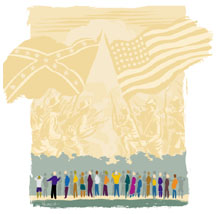To read our exclusively online On the Campus column, click here.

May 12, 2004: On the Campus
 The
battleground and the spirit
The
battleground and the spirit
By Brooke Robert Stoddard ’05
Illustration by Steven Veach
When several students complained they had dressed inappropriately for what would be his final Gettysburg Battlefield tour as a Princeton history professor, James M. McPherson responded that wearing khakis in 80-degree weather was nothing compared to the conditions Civil War soldiers faced there from July 1 to July 3, 1863.
“Troops wore wool uniforms and cotton layers underneath,” he said. “Imagine wearing that while running toward enemy lines in summer heat and humidity.”
Detailing the lives of Union and Confederate soldiers during one of the war’s turning-point battles has been a McPherson tradition, advertised by word of mouth, for 22 years. In the late ’80s groups averaged 20 people, but a steady yearly increase in the ’90s foreshadowed April 17’s record crowd of 260 students, parents, faculty, and alumni who arrived at Gettysburg for an eight-hour walk through fields, creeks, and mud.
The admiration for McPherson’s tour, considered by many students and alums to be among the most worthwhile day trips faculty offer – even Senator William Frist ’74 and his son Harrison ’06 were present this year – parallels the popularity of his class, Civil War and Reconstruction, which consistently enrolls nearly 400 students.
To preface the tour McPherson assigned his students Michael Shaara’s The Killer Angels, a 1974 novel about the Gettysburg conflict, to introduce sites they visited, including Devil’s Den, The Wheatfield, and Little Round Top. Ending with a march where Pickett’s Charge took place and taking a pensive moment at the cemetery where President Lincoln delivered his celebrated address, McPherson reflected on why he has devoted his professional life to studying the Civil War.
“It’s important for people to understand the devotion and determination of both sides, that both Confederate and Union soldiers fought for freedom and the ideals for which their society stood,” he said.
McPherson, this year’s Baccalaureate speaker, retires in June.
Campus posters featuring Bart Simpson with angel wings, instead of his favorite “toys” – a slingshot and cherry bombs – should have been considered warnings: Religion journalist Mark Pinksy’s talk on the spiritual life of America’s most popular cartoon family would not be a typical Princeton lecture. Nor is it usual to have doughnuts, a favorite food on the show, available for attendees.
“You’ll laugh during this lecture,” Pinsky told 150 students and faculty Monday, April 19. “I just ask that all of you regular Simpsons viewers hold your laughter until each joke is finished.”
Taking a quick poll, he discovered that nearly everyone in the audience considered themselves a huge Simpsons’ fan.
Pinsky began watching The Simpsons, television’s longest-running prime-time animated series, in 1999, curious about one of his son’s favorite shows. Intrigued by the references to the spiritual life in many episodes, over the next few years he collected material for his book, The Gospel According to the Simpsons (2001), which argues that despite using humor to poke at religion, the show ultimately supports rather than criticizes faith as an important personal and family value.
“I was interested in the role faith plays in the lives of the characters. They say grace at meals, attend church on Sundays, and read the Bible,” he said. “In the wacky and cracked way we see here, that’s the way a working-class family in America practices religion.”
Showing a clip of Simpson son Bart selling his soul to a friend for five dollars, Pinsky talked about a trend over the past decade to promote religion, especially Christianity, through pop culture. Not intending to evangelize, the show’s writers added religious themes to the show because they had run out of other material, Pinsky said.
But comedy writers are still forbidden to pick the fruit of certain trees.
“You can’t make fun of Jesus, or deal with the resurrection or crucifixion. You can only get away with that on South Park,” Pinsky said, referring to a late-night animated show featuring raunchy humor much more likely to offend viewers.
Pinsky concluded by showing a segment in which Bart’s ever-gluttonous father, Homer, eagerly awaits an underground barbecue as he and his family descend to hell.
Afterward, doughnuts all gone, students trickled back to their dining
halls, which, while not exactly hell, aren’t heaven either. ![]()
Brooke Robert Stoddard ’05 is a history major from Alexandria, Virginia.
